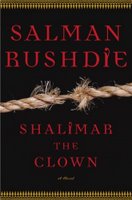Shalimar the Clown by Salman Rushdie: Book Review

I savored the moment when I would read Shalimar the Clown, anticipated it as one might a lazy Sunday afternoon. I remember when I first read Satanic Verses in the same way one remembers falling in love for the first time--fondly, with real affection. Midnight’s Children, Last Moor’s Sigh, his short stories in East/West. These books are the reason I get excited when I hear that Salman Rushdie appeared on Seinfeld or Bridget Jones’ Diary or that he gave an interview at the restaurant down the street from my work. A writer whose wonderfully chaotic genius plays out in each page he writes with all the might of a true magician.
Which is all the more reason why it was so dismaying to find rampant mediocrity in his latest book, Shalimar the Clown. With the same dizzying rhetoric that has become his trademark, Rushdie lays out a multi-generational, multi-continental, multi-historical story of one man, his wife, her lover and all the people that populate their world. The book opens in
It's a story that despite all of its decorations, is uncomfortably simple. Two young people deeply in love are ripped apart by a beautiful outsider who whisks away the simple village girl for a fling that destroys all their lives. The husband becomes rabidly, murderously vengeful. A daughter named India/Kashmiri is born who grows up predictably troubled. Woven into the background, is the larger histories of WW II, the Indo-Pakistan war, and the LA riots.
Surprisingly clumsy at times, with overly-drawn out thought bubbles from characters whose maudlin self-importance was embarrassing. Take this passage for instance:
“The words right and wrong began to crumble, to lose meaning, and it was as if Max were being murdered all over again, assassinated by the voices who were praising him, as if the Max she knew were being unmade…” ...and so on.
There was a particularly hollow scene where Rushdie slyly alludes to a “writer against God, who spoke French and had sold his soul to the West”. He gets killed off by Islamic terrorists.
Aside from half-baked philosophsi-fizing, Rushdie draws problematic conclusions about the dangers of breaking free of one’s role and place in life. The characters in his novel suffer horribly for having ambitions, and dreaming big. Love is possessive and jealous and will always either stifle or betray you—it is an inescapable curse.
 Bald Marys
Bald Marys


2 Comments:
When I saw this book at the library a while back, I got all excited, thinking of you and back when we read The Satanic Verses and our times at the house on Linn St. I had added it to my reading list, but your review has made me reconsider how soon I should start reading it.
ahh..i remember when we read satanic verses together! You and Jack and me hung out in our porch; it was a beautiful summer day:)
yeah; shalimar was a total disapointment. i guess not total, it is actually worth a read, but it just doesn't have the bite that his earlier works does. Tell me what you think, i'd be interested. :)
Post a Comment
Subscribe to Post Comments [Atom]
<< Home